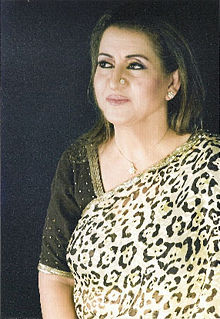Loading AI tools
Pakistani ghazal singer From Wikipedia, the free encyclopedia
Nadira Begum (Urdu: نادرہ بیگم), better known by her pseudonym title, Munni Begum (Urdu: مُنّی بیگم) is a Pakistani vocalist and ghazal singer.[2][3][1]
Munni Begum منی بیگم | |
|---|---|
 | |
| Background information | |
| Birth name | Nadira Begum |
| Born | 1955 (age 68–69)[1] Murshidabad, Bengal Presidency British India[1] |
| Origin | Pakistan |
| Genres | Ghazal |
| Occupation | Ghazal singer |
| Years active | 1976 – present |
Munni Begum was born Nadira Begum in Murshidabad (now in West Bengal, India) in 1946.[1] The third child of seven children. She first started taking music lessons from the famous singer Ustad Khwaja Ghulam Mustafa Warsi. It was this music teacher who gave her this professional name due to her small size and young age. Subsequently, she studied in the school of music for three years, and thereafter, she launched her career.[4][1]
Her parents migrated from India to East Pakistan in the early 1950s. East Pakistan later became independent Bangladesh. She studied in PAF Shaheen School,[5] Dacca; however, she moved to Karachi, West Pakistan due to Bangladesh Liberation War of 1971.[4]
Munni Begum began her career as a singer in Karachi, Pakistan in the 1970s. She released her first album of ghazals in 1976.[4] Then she sang many more hit ghazals and thus became a renowned ghazal singer of Pakistan.[6] In her news media interviews, she always was quick-witted and bold. Even though Urdu language was not her mother tongue, she showed a remarkable talent for choosing ghazals with simple language. This was very effective and became one of the reasons of her popularity among common people. The other reasons for her popularity were that she had a voice characterized by its clarity and strength.[4] In the 1980s, Munni Begum's rise coincided with the rapid growth of a then new technology, the cassette tape. Cassette tape prices were cheap compared to the old technology of vinyl records. On top of that, Munni Begum had a rich voice with many shades. She also was a good harmonium player.[4]
Munni Begum was married in the 1980s which resulted in a divorce in 1998. She has two daughters, Muniba Hasnain and Minara Umer, and one son Syed Mohammad Asad Ali. As of 2016, she lives in Chicago, United States and does not perform regularly.[4]
As for Munni Begum's hit ghazals, the list is very long. Some of these are:
Seamless Wikipedia browsing. On steroids.
Every time you click a link to Wikipedia, Wiktionary or Wikiquote in your browser's search results, it will show the modern Wikiwand interface.
Wikiwand extension is a five stars, simple, with minimum permission required to keep your browsing private, safe and transparent.